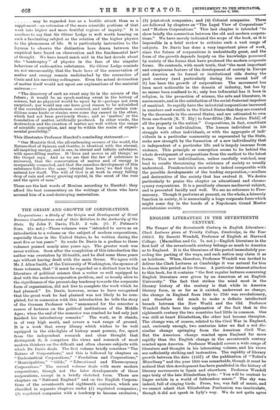THE ORIGIN AND GROWTH OF CORPORATIONS.
Corporations : a Study of the Origin and Development of Great Business Combinations and of their Relation to the Authority of the State. By John P. Davis, Ph.D. 2 vols. (G. P. Putnatn's Sons. 21s. net.)—These volumes were "intended to serve as an introduction to a volume on the subject of modern corporations, especially those in the United States, to be written during the next five or ten years." So wrote Dr. Davis in a preface to these volumes penned nearly nine years ago. The greater work was never written. Soon after the completion of this introduction the author was overtaken by ill-health, and he died some three years ago without having dealt with the main theme. We agree with Mr. J. Allen Smith, of the University of Washington, the sponsor of these volumes, that "it must be regarded as a distinct loss to the literature of political science that a writer so well equipped to deal with the modern-corporation problem, and so keenly alive to the significance of the present-day tendency towards the corporate form of organisation, did not live to complete the work which he had planned." Dr. Davis, however, seems to have recognised that the great work he had planned was not likely to be com- pleted, for in connexion with this introduction he tells the story of the German Professor who "announced for the semester a course of lectures on the political institutions of the Middle Ages ; when the end of the semester was reached he had only just finished his introductory remarks." The work, as it stands, is of very high merit, and covers a vast range of ground. It is a work that every library which wishes to be well equipped in the side-lights of history must possess, for, apart from the independent research and clear thought that distinguish it, it comprises the views and research of most modern thinkers on the difficult and often obscure subjects with which Dr. Davis deals. The first volume briefly considers "The Nature of Corporations," and this is followed by chapters on "Ecclesiastical Corporations," "Feudalism and Corporations," "Municipalities," "Gilds," "Educational and Eleemosynary Corporations." The second volume deals with more modern corporations, though not the later developments of those corporations, except in a briefly sketched form. There are chapters on "National England" and on the English Corpora- tions of the seventeenth and eighteenth centuries, which are classified in separate chapters under (1) regulated companies ; (2) regulated companies with a tendency to become exclusive ; (3) joint-stock companies; and (4) Colonial companies. These are followed by chapters on "The Legal View of Corporations" and "Modern Corporations." This last chapter is intended "to show briefly the connection between the old and modern corpora- tions." We have merely indicated the scope of the book, as it is impossible in a brief review to criticise such a vast range of subjects. Dr. Davis has done a very important piece of work, since the future of corporations is undoubtedly great, and the form of the growth depends largely on the knowledge possessed by society of the forces that have produced the modern corporate forms. He contends, with much truth, that "the most important and conspicuous feature of the development of society in Europe and America on its formal or institutional side during the past century (and particularly during the second half of it) has been the growth of corporations. The movement has been most noticeable in the domain of industry, but has by no means been confined to it; only less influential has it been in religion, in the promotion of science, the arts and literature, in amusements, and in the satisfaction of the social-fraternal impulses of mankind. So rapidly have the industrial corporations increased in numbers and wealth in the United States that they are counted by the thousands in the several States, and are estimated to own from one-fourth [R. T. Ely] to four-fifths [Mr. Justice Field] of all the property in the nation." Corporations, in fact, constitute a new form of individualism. The human individual in his struggle with other individuals, or with the aggregate of indi- viduals in a particular community as represented by the State, seeks new strength by the formation of a new individuality that is independent of a particular life and is largely immune from violence. This principle or conception seems to lie behind the whole development of corporations from the earliest to the latest forms. This new individualism, unless carefully watched, may lead to results threatening the existence of society as usually understood. Frankenstein's monster is indeed comparable with the possible developments of the trading corporation,—soulless and destructive of the society that has evolved it. We desire particularly to praise the chapter on educational and eleemo- synary corporations. It is a peculiarly obscure mediaeval subject, and is presented lucidly and well. We see no reference to Free- masonry. Though it performs at present, on the whole, a leisurely function in society, it is numerically a huge corporate force which might some day in the hands of a Napoleonic Grand Master revolutionise society.






























































 Previous page
Previous page